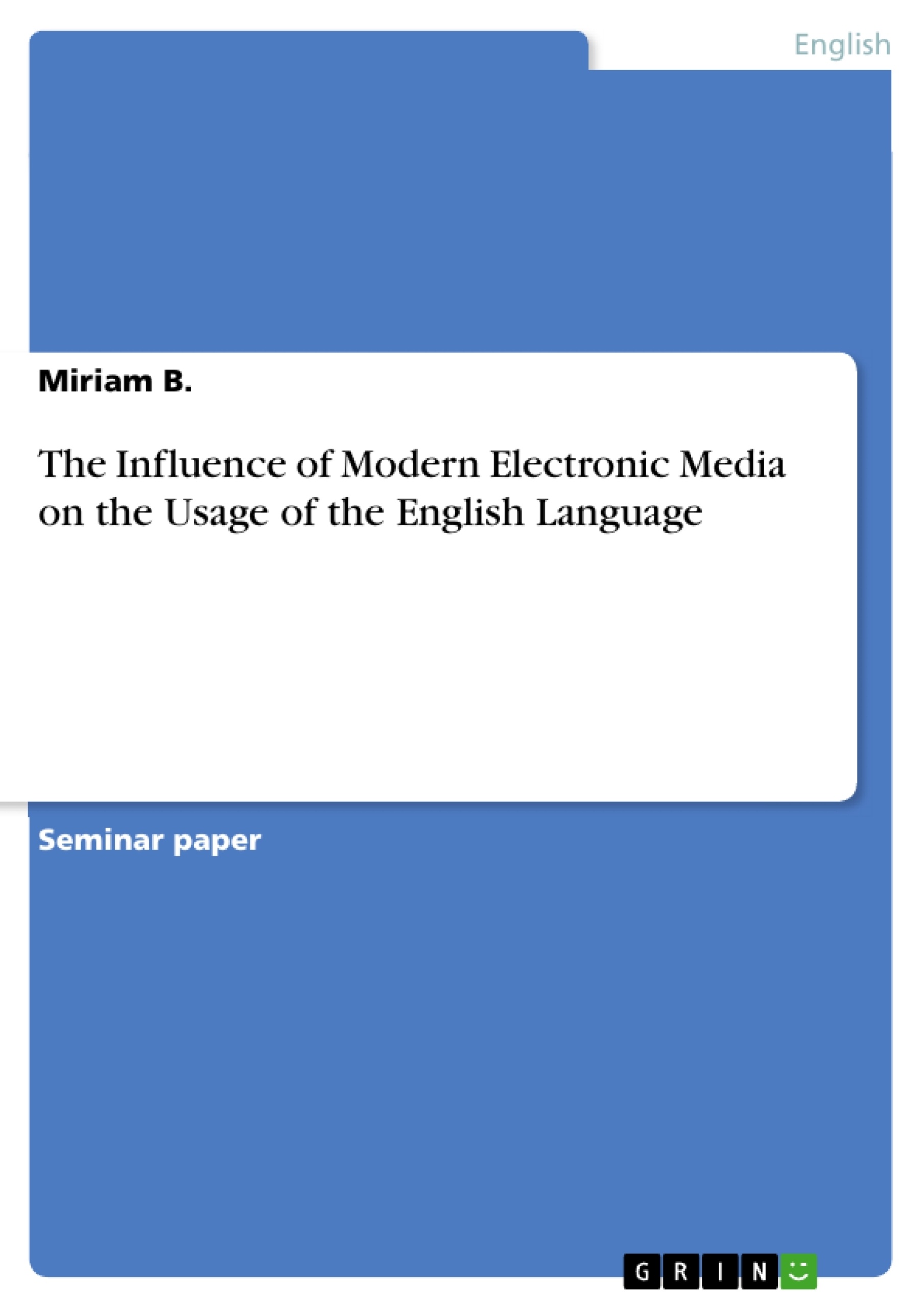Are modern electronic media, such as blogs, changing our language usage, especially of the English language? And if so, how and to what extent do they do this? This paper will answer these questions.
Electronic media, including the devices that were brought along, did become a changing power of society. While dealing with this changing power more closely, it becomes conspicuous that the Internet functions as a significant force. More precisely, it appears as an engine that keeps electronic media development going. Furthermore, the Internet stands for another massive influence concerning any human being on earth that is in favor of being connected to others: Language. To make it more specific there is talk of language change.
When the Internet’s power is evaluated from a superficial perspective the thoughts that the Internet creates new words, makes prevailing words disappear, uses abbreviations instead and spreads the results on weblogs or other social media sites, comes to mind easily.
However, the Internet brought various changes. One of its obvious ones is the way people talk to each other due to modern technology; looking on a phone screen has replaced looking into other people’s eyes. Besides, the society is not forced to leave their safe homes anymore because anything that might be needed is available on the Internet, ready to be clicked on.
It seems like this medium has made life easier but what is also mandatory to take into consideration are all the negative side effects that electronic media brought along: The loss of punctuation and spelling skills due to texting and the need of including as much information as possible in as little text as possible or the standardization of using abbreviations.
Inhaltsverzeichnis (Table of Contents)
- Introduction.
- The Internet and Language Change.
- The Function of Online Language.
- How Computer-Mediated Communication (CMC) Influences our Lives.
- Asynchronous vs. Synchronous Communication Media
- Linguistic Aspects of Speech vs. Writing.
- Syntactic Properties of Computer-Mediated Language
- Sample Analysis of a Blog.
- The Influential Power of the Internet
- Conclusion.
Zielsetzung und Themenschwerpunkte (Objectives and Key Themes)
This paper aims to explore the impact of the internet on language change and the specific characteristics of online language. It investigates how the internet has influenced communication and the development of new linguistic features.
- Language change driven by technological advancements.
- The function and specific characteristics of online language.
- The impact of computer-mediated communication on interpersonal interactions.
- The linguistic differences between speech and writing in online contexts.
- An analysis of a blog as a case study of internet language.
Zusammenfassung der Kapitel (Chapter Summaries)
- Introduction: This chapter introduces the topic of electronic media and its influence on society, focusing on the internet's role in language change. It highlights the various changes the internet has brought about, both positive and negative, and establishes the paper's focus on linguistic aspects of internet language.
- The Internet and Language Change: This chapter explores the impact of the internet on language change, citing examples of new words and evolving meanings of existing words. It discusses internal and external factors that influence language change, emphasizing the internet's role in accelerating this process.
- The Function of Online Language: This chapter delves into the specific characteristics of online language, highlighting the development of new words and abbreviations driven by technological advancements and the desire for efficient communication. It also discusses the concept of language as a tool for action and the importance of shared understanding within the online world.
- How Computer-Mediated Communication (CMC) Influences our Lives: This chapter examines the impact of computer-mediated communication (CMC) on our lives, highlighting its role in transforming communication methods and social interactions. It discusses various forms of online communication and explores the possibilities and challenges it presents.
Schlüsselwörter (Keywords)
This paper focuses on the key themes of language change, internet language, computer-mediated communication, online communication, linguistic aspects of speech and writing, and blog analysis. The research draws upon the contributions of linguists like David Crystal and Naomi Baron to explore the impact of the internet on language use and its implications for communication in the digital age.
Frequently Asked Questions
How does the internet influence language change?
The internet acts as an engine for language change by creating new words, popularizing abbreviations, and accelerating the spread of linguistic trends through social media and blogs.
What is Computer-Mediated Communication (CMC)?
CMC refers to communication that occurs through electronic devices and the internet, encompassing both synchronous and asynchronous media.
What are the negative effects of electronic media on language?
Potential negative side effects include the loss of punctuation and spelling skills due to texting and the over-standardization of abbreviations.
How does online language differ from traditional writing?
Online language often blends characteristics of speech and writing, focusing on efficiency and shared understanding within digital communities.
Which linguists' work is referenced in this study?
The research draws upon the contributions of notable linguists such as David Crystal and Naomi Baron to explore digital communication trends.
- Quote paper
- Miriam B. (Author), 2019, The Influence of Modern Electronic Media on the Usage of the English Language, Munich, GRIN Verlag, https://www.grin.com/document/468191



